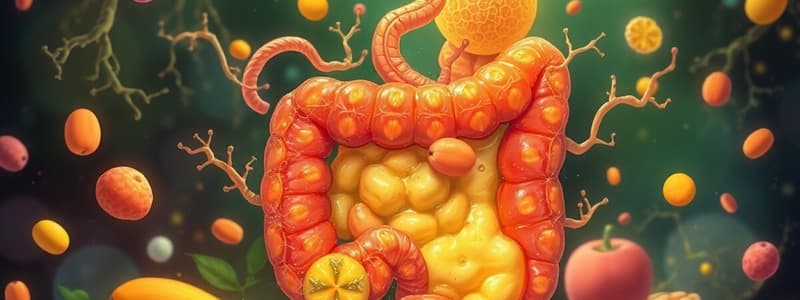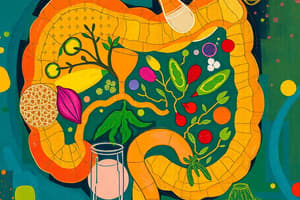Podcast
Questions and Answers
What is the approximate number of microbial cells in the human gut compared to the total cells in the body?
What is the approximate number of microbial cells in the human gut compared to the total cells in the body?
- 10 times more than in the body (correct)
- Half as many as in the body
- Equal to the total cells in the body
- 2 times more than in the body
Which bacterial species is NOT a main component of the gut microbiota?
Which bacterial species is NOT a main component of the gut microbiota?
- Prevotella
- Ruminococcus
- Escherichia (correct)
- Firmicutes
How can dietary changes impact the gut microbiome?
How can dietary changes impact the gut microbiome?
- They can alter the diversity of gut microbiome in both short and long term (correct)
- They can only affect gut bacteria in the long term
- They have no effect on gut bacteria composition
- They can completely eliminate all bacterial species
What is the role of the ratio between Bacteroidetes and Firmicutes in the human body?
What is the role of the ratio between Bacteroidetes and Firmicutes in the human body?
What can result from an imbalance in bacterial species in the gut microbiome?
What can result from an imbalance in bacterial species in the gut microbiome?
Which of the following is important for immune and metabolic functions and is produced by bacteria?
Which of the following is important for immune and metabolic functions and is produced by bacteria?
What is a common outcome of chronic low-grade inflammation linked to gut microbiota?
What is a common outcome of chronic low-grade inflammation linked to gut microbiota?
What is the estimated weight of the gut microbiota in a human body?
What is the estimated weight of the gut microbiota in a human body?
What was found to be higher in individuals adhering to the Mediterranean diet?
What was found to be higher in individuals adhering to the Mediterranean diet?
Which bacterial groups were noted to be more abundant in individuals consuming the Mediterranean diet?
Which bacterial groups were noted to be more abundant in individuals consuming the Mediterranean diet?
What is dietary fiber primarily composed of?
What is dietary fiber primarily composed of?
Which type of dietary fiber is known for being metabolized by gut bacteria to produce SCFAs?
Which type of dietary fiber is known for being metabolized by gut bacteria to produce SCFAs?
What effect does a diet high in animal protein have on gut bacteria?
What effect does a diet high in animal protein have on gut bacteria?
Which dietary intervention resulted in an increase in Enterorhabdus and Lachnoclostridium?
Which dietary intervention resulted in an increase in Enterorhabdus and Lachnoclostridium?
Which of the following diets is characterized by being low in fiber and has been linked to chronic conditions?
Which of the following diets is characterized by being low in fiber and has been linked to chronic conditions?
What type of bacteria primarily increases as a result of adhering to a Mediterranean diet?
What type of bacteria primarily increases as a result of adhering to a Mediterranean diet?
What effect does a high-fiber diet have on SCFA production?
What effect does a high-fiber diet have on SCFA production?
What is the main characteristic of dietary fibers?
What is the main characteristic of dietary fibers?
In a comparison study between children from Burkina Faso and Italy, what was observed in the microbiome of the African children?
In a comparison study between children from Burkina Faso and Italy, what was observed in the microbiome of the African children?
What changes occur to gut microbiota in response to a low-fat, high-fiber diet?
What changes occur to gut microbiota in response to a low-fat, high-fiber diet?
Which of the following dietary components is NOT part of the Western diet as described?
Which of the following dietary components is NOT part of the Western diet as described?
Which bacterium is associated with a fiber-rich diet as seen in the Burkina Faso children?
Which bacterium is associated with a fiber-rich diet as seen in the Burkina Faso children?
What is the primary consequence of consuming a high-fat diet regarding gut microbiota?
What is the primary consequence of consuming a high-fat diet regarding gut microbiota?
How do plant-based diets affect the intestinal microbiome compared to Western diets?
How do plant-based diets affect the intestinal microbiome compared to Western diets?
What effect does low fiber intake have on the production of SCFA?
What effect does low fiber intake have on the production of SCFA?
Which bacterial group showed the most prominent bifidogenic effect in type II diabetics after supplementation with inulin-type fructans?
Which bacterial group showed the most prominent bifidogenic effect in type II diabetics after supplementation with inulin-type fructans?
What was the effect of resistant starch on the gut microbiota?
What was the effect of resistant starch on the gut microbiota?
Which component is emphasized for its positive effects on the gut microbiome?
Which component is emphasized for its positive effects on the gut microbiome?
What is the primary role of flavonoids as mentioned in relation to gut health?
What is the primary role of flavonoids as mentioned in relation to gut health?
What are SCFA derived from in the gut microbiome?
What are SCFA derived from in the gut microbiome?
In what context are polyphenols frequently discussed?
In what context are polyphenols frequently discussed?
What common effect do both resistant starch and inulin-type fructans share regarding gut health?
What common effect do both resistant starch and inulin-type fructans share regarding gut health?
What is the primary role of short-chain fatty acids (SCFA) in metabolism?
What is the primary role of short-chain fatty acids (SCFA) in metabolism?
Which compounds are mainly responsible for the production of trimethylamine (TMA) in the gut?
Which compounds are mainly responsible for the production of trimethylamine (TMA) in the gut?
Which of the following primary bile acids is NOT mentioned as a type?
Which of the following primary bile acids is NOT mentioned as a type?
What is the consequence of converting TMA into TMAO in the liver?
What is the consequence of converting TMA into TMAO in the liver?
The microbiota transforms primary bile acids into which of the following?
The microbiota transforms primary bile acids into which of the following?
What dietary pattern is associated with high levels of carnitine and choline?
What dietary pattern is associated with high levels of carnitine and choline?
Which cells are influenced by metabolites formed from tryptophan metabolism in the gut?
Which cells are influenced by metabolites formed from tryptophan metabolism in the gut?
What is the relationship between SCFA and dietary fiber?
What is the relationship between SCFA and dietary fiber?
Flashcards
Gut Microbiome Composition
Gut Microbiome Composition
The variety and proportion of different types of bacteria, along with other microbes like viruses and fungi, in the gut.
Diet's Impact on Gut Microbiome
Diet's Impact on Gut Microbiome
Diet significantly influences the types and amounts of bacteria in the gut.
Bacteroidetes and Firmicutes
Bacteroidetes and Firmicutes
Two major bacterial groups in the gut, whose ratio is important for health.
Gut Microbiome and Disease
Gut Microbiome and Disease
Signup and view all the flashcards
Gut Microbes' Role in Health
Gut Microbes' Role in Health
Signup and view all the flashcards
Western Diet
Western Diet
Signup and view all the flashcards
Obesity and Type 2 Diabetes
Obesity and Type 2 Diabetes
Signup and view all the flashcards
Diet-Disease Link
Diet-Disease Link
Signup and view all the flashcards
Animal protein diet effect on gut microbiome
Animal protein diet effect on gut microbiome
Signup and view all the flashcards
Western diet and gut health
Western diet and gut health
Signup and view all the flashcards
High-fat diet effect on gut microbiome
High-fat diet effect on gut microbiome
Signup and view all the flashcards
High-fiber diet and gut microbiome
High-fiber diet and gut microbiome
Signup and view all the flashcards
Mediterranean Diet and Gut Microbiome
Mediterranean Diet and Gut Microbiome
Signup and view all the flashcards
Fiber and gut microbiome
Fiber and gut microbiome
Signup and view all the flashcards
Burkina Faso vs. Italian children gut microbiome study
Burkina Faso vs. Italian children gut microbiome study
Signup and view all the flashcards
SCFA production and gut health
SCFA production and gut health
Signup and view all the flashcards
Mediterranean Diet
Mediterranean Diet
Signup and view all the flashcards
Gut Microbiome Diversity
Gut Microbiome Diversity
Signup and view all the flashcards
Dietary Fiber
Dietary Fiber
Signup and view all the flashcards
Short-Chain Fatty Acids (SCFAs)
Short-Chain Fatty Acids (SCFAs)
Signup and view all the flashcards
Firmicutes and Actinobacteria
Firmicutes and Actinobacteria
Signup and view all the flashcards
Soluble Fiber
Soluble Fiber
Signup and view all the flashcards
Insoluble Fiber
Insoluble Fiber
Signup and view all the flashcards
What happens when fiber intake is low?
What happens when fiber intake is low?
Signup and view all the flashcards
Prebiotic Inulin
Prebiotic Inulin
Signup and view all the flashcards
Resistant Starch
Resistant Starch
Signup and view all the flashcards
Effect of Resistant Starch on Bifidobacteria
Effect of Resistant Starch on Bifidobacteria
Signup and view all the flashcards
Polyphenols
Polyphenols
Signup and view all the flashcards
Flavonoids
Flavonoids
Signup and view all the flashcards
SCFA production
SCFA production
Signup and view all the flashcards
What are bacterial metabolites?
What are bacterial metabolites?
Signup and view all the flashcards
What are SCFAs?
What are SCFAs?
Signup and view all the flashcards
SCFAs benefit
SCFAs benefit
Signup and view all the flashcards
Bile acids
Bile acids
Signup and view all the flashcards
Tryptophan metabolism
Tryptophan metabolism
Signup and view all the flashcards
TMA
TMA
Signup and view all the flashcards
TMAO
TMAO
Signup and view all the flashcards
Gut microbiome
Gut microbiome
Signup and view all the flashcards
Study Notes
Nutritional Modulation of the Gut Microbiome
- The gut microbiome contains 10 times the number of microbial cells as the human body.
- Approximately 100 trillion microbes live in the human gut.
- Roughly 5000 different species of microbes live in the gut.
- The gut microbiome weighs approximately 2 kilograms.
- The gut microbiome is composed of bacteria, viruses, fungi, and parasites.
- Major bacterial species in the gut include Prevotella, Ruminococcus, Bacteroidetes, and Firmicutes.
Learning Objectives
- Students will learn about the gut microbiota overview.
- Students will learn about different dietary styles (Western, plant-based, high-fat, medical ketogenic, and Mediterranean).
- Students will learn about the effect of each diet on the gut microbiota.
- Students will learn about fiber and the gut microbiome.
- Students will learn about the effects of bacterial metabolites on inflammation and metabolic endotoxemia.
The Human Microbiome
- 25 phyla are known.
- ~2,000 genera are known.
- ~5,000 species are known.
- ~80% of the metagenome is mappable.
- ~316 million genes are known.
- ~20% of microbial genomes remain unknown.
- ~40% of functional genes are yet to be matched with existing databases.
Geographical Location and Phylum Abundance
- Phylum abundance varies across different geographical regions.
- Firmicutes are the most prevalent phylum (51.1%).
- Bacteroidetes constitute a significant portion (36.0%).
- Other phyla are present in lesser amounts.
Bacteria Ratio
- The ratio between Bacteroidetes and Firmicutes is vital to human health and disease.
Importance of the Gut Microbiome
- Gut bacteria are central to harvesting energy from food, maintaining beneficial/harmful bacteria balance, and producing essential neurotransmitters, enzymes, and vitamins.
- Vitamin K, for example, is produced by bacteria and plays a role in immune and metabolic functions.
- Imbalances in gut bacterial species might lead to disease.
Diet Effect on Gut Bacterial Composition
- Diet is a major factor in altering gut bacterial composition.
- Diet changes may lead to changes in the ratio of bacterial species important to health.
- Diet plays a role in influencing conditions like obesity and type II diabetes. (Western diets are linked to inflammation and obesity)
Beneficial and Harmful Bacterial Species
- A high-animal protein diet often increases harmful bacteria (Bacteroides, Alistipes, Bilophila).
- Beneficial bacteria (e.g., Lactobacillus, Roseburia, E. rectale) are often decreased with this type of diet.
- Changes in these species can affect gut microbiome diversity.
Effect of Animal-Based Diets
- Western diets (high fat, high sugar) are linked to chronic low-grade inflammation, metabolic issues, and obesity.
Effect of Plant-Based Diets
- Low-fat, high-fiber diets can positively alter the microbial composition of the gut.
- They can support beneficial bacteria (e.g., Prevotella and Bacteroides).
- Plant-based diets can reduce Firmicutes.
European vs. African Diet Study
- A study comparing European and African children revealed differences in microbiome composition.
- European children had lower fiber consumption and a different gut microbiome composition compared to African children.
Effect of Gut Microbiome on Health
- The gut microbiome can have a positive or negative impact on health. (high versus low inflammatory bacteria)
- Specific diets might increase or decrease the occurrence of inflammatory bacteria.
Fiber and the Gut Microbiome
- Dietary fiber includes non-digestible carbs and lignin.
- Fiber types differ in chemical structure, solubility, viscosity, and fermentability.
- Soluble fiber is metabolized by gut bacteria, forming short-chain fatty acids (SCFAs).
- Insoluble fiber helps maintain gut health.
Fiber Effect on the Gut Microbiome
- Firmicutes and Actinobacteria are the main responders to dietary fiber.
- High-fiber diets encourage the production of SCFAs.
- Reduced dietary fiber can hinder SCFA production, reducing beneficial effects on gut health.
Prebiotic Inulin
- Inulin-type fructans influence the gut microbiome in individuals with type II diabetes.
- The beneficial effect of these fructans involves increases in Bifidobacteria and SCFA production.
- Inulin-type fructans can cause changes in the intestinal microbial composition.
Resistant Starch
- Resistant starch positively impacts gut microbiota.
- Resistant starch increases Bifidobacterium and other beneficial bacterial species.
- Resistant starch increases SCFA production.
Phytochemicals and Gut Microbiome
- Polyphenols are found in various plants and affect the microbiome positively.
- Flavonoids are found in fruits and vegetables; they exhibit gut-modulating effects, like reducing LPS and increasing SCFA production.
- Specific polyphenols are linked to anti-cancer properties.
Bacterial Metabolites
- Bacterial metabolites of different origins can influence inflammation and metabolic endotoxemia.
- Includes SCFAs, bile acids, tryptophan, and trimethylamine.
Short-Chain Fatty Acids (SCFAs)
- SCFAs are produced by bacterial fermentation of dietary fiber.
- SCFAs can improve weight loss, enhance glycemic control, and promote better metabolic health.
- SCFAs can have significant effects on the gut microbiome, reducing inflammation, improving insulin resistance, and influencing satiety.
Bile Acids
- Bile acids are secreted into the gut in the presence of fat.
- Primary bile acids (cholic acid and chenodeoxycholic acid) are transformed by gut microbiota.
Tryptophan
- Indole derivatives and tryptamine form through tryptophan metabolism, influencing epithelial and immune cells.
- Tryptophan metabolites can reduce inflammation and reprogram Treg cells.
Trimethylamine (TMA/TMAO)
- TMA is a byproduct of the breakdown of red meat and processed food components.
- TMA is converted to TMAO, which is linked to inflammation, type II diabetes, and obesity.
Summary
- Diet significantly influences bacterial composition in the gut.
- Shifts in beneficial bacteria (e.g., Prevotella and Bacteroides) are associated with obesity and diets high in fat and sugar, low in fiber.
- Plant-based diets can have beneficial effects on the gut microbiome and overall health, potentially reducing inflammation, improving insulin sensitivity, and promoting satiety.
- Mediterranean-type diets are linked to positive changes in gut microbiome composition and production of beneficial metabolites.
Studying That Suits You
Use AI to generate personalized quizzes and flashcards to suit your learning preferences.




